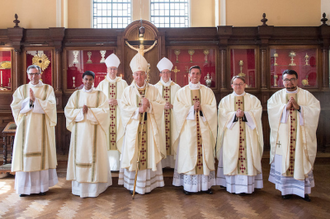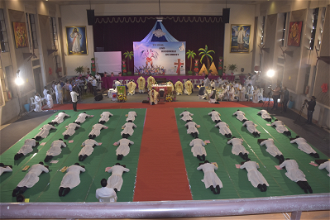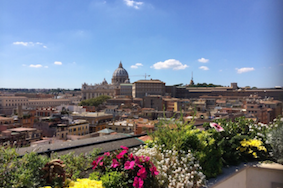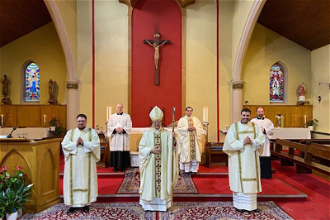Westminster: Ordinations to priesthood and diaconate

l-r: Deacons William Johnstone and Tim Mangatal, Bishop Nicholas Hudson, Cardinal Vincent Nichols, Bishop John Sherrington, and Fathers Alexander Balzanella, David Knight, Axcel Soriano image: Mazur/CBCEW
Source: Archbishops House
Today, Saturday 19th September, His Eminence Cardinal Vincent Nichols ordained two men to the diaconate and three men to the priesthood in Westminster Cathedral. For the first time since July 1999, priests and deacons were ordained together in one celebration, 'under the restrictions of the pandemic'.
The Cardinal used this occasion to reflect on the Sacrament of Holy Order in his homily. It is one Sacrament, he said, expressed in three degrees, shared by deacons, priests and bishops: 'this Sacrament conforms its recipients to Christ, the Head of the Church. In his name, those who share this Sacrament are commissioned to maintain and develop order in the life of the Church.'
This order is based, not on a command structure, but on humble service: "Service is the permanent and underlying foundation of all that is done by deacon, priest and bishop."
It is shaped by a 'humble discernment of what the Lord is asking of us; a discernment carried out in the context of the Church and with total fidelity to its Master; a discernent, therefore, guided by its Head and by those who are ordained into a sharing in the mission of Christ the Head,' he said.
In an age of self-definition and self-entitlement where rights are to be "demanded and defended" and entitlements pursued," he said that this is "a temptation we face" and cautioned that a "culture of entitlement has no place among us."
He prayed for the candidates that their diaconate may "always give their ministry its fundamental quality of generous service," and for those being ordained to the priesthood "as their hands are anointed to serve the people in holiness of life and holiness of order, in humble service and daily commitment."
After the homily, the Cardinal proceeded to ordain William Johnstone and Tim Mangatal to the diaconate, and Alexander Balzanella, David Knight and Axcel Soriano to the priesthood.
Some elements of the celebration were modified as a result of the pandemic restrictions. Only the Cardinal, Bishops John Sherrington and Nicholas Hudson, and a handful of concelebrating priests laid hands over the heads of the candidates. Similarly, the sign of peace was given by the Cardinal to the newly-ordained priests and deacons on behalf of all the clergy and people.
During the Liturgy of the Eucharist, the paten and chalice used by the Cardinal were those presented by Pope Benedict XVI on his visit to the Cathedral 10 years ago.
Each of the newly ordained priests were presented with an individual chalice and paten for their use during the Mass, with each set having a particular historical significance.
Fr Alexander Balzanella, who was in formation at the Venerable English College in Rome, was presented with a late 15th century English silver gilt chalice, given by the Swaything family. Its stem is engraved with a trellis, and the knob set with the letters MARIA, and a rose. It honours the memory of the many martyrs of the English College.
Fr David Knight was presented with an English silver gilt chalice, dating from 1529. The cup is engraved with part of one of the prayers before Communion in the Sarum Missal. It has a hexagonal stem with twisted ropework. This chalice was used for many years prior to the liturgical reforms of Holy Week in the 1950s and 1960s in the procession to the Altar of Repose on Maundy Thursday. It was presented to the Cathedral by Baron Antonio French and his sisters.
Fr Axcel Soriano was presented with an English recusant silver gilt chalice, made around 1680, and engraved with leaves and the Crucifixion. Faces of cherubs adorn the knob.
Fr David Knight will serve as Assistant Priest at The Annunciation in Burnt Oak; Fr Axcel Soriano will serve as Assistant Priest at St John Fisher, Harrow North; and Fr Alexander Balzanella returns to Rome for continuing studies.
Deacon William Johnstone will serve at Our Lady, St John's Wood, and Deacon Tim Mangatal will serve at St Mary, Cadogan Street in Chelsea.
Photo, from left to right, Deacons William Johnstone and Tim Mangatal, Bishop Nicholas Hudson, Cardinal Vincent Nichols, Bishop John Sherrington, and Fathers Alexander Balzanella, David Knight and Axcel Soriano (Mazur/CBCEW.org.uk)
Full text of the homily given by His Eminence Cardinal Vincent Nichols:
Our ceremony today is quite unusual, for at least two reasons.
First we are gathering under the restrictions of the pandemic. We are only too aware of them. We accept and exercise our responsibilities as conscientiously and deliberately as we can. But they leave us feeling deprived of the usual richness of celebration of the ordination rites.
Then, this occasion is unusual for this morning both deacons and priests are to be ordained. Usually these are separate occasions, each with its own flavour and impact.
Celebrating them together gives us something to ponder.
The sacrament we celebrate this morning is the Sacrament of Holy Order. Often we speak of Holy Orders, in the plural, but the title, properly, is Holy Order. Deacon, priest, bishop: this is one Order, expressed in three different degrees, but strictly one.
So we remember today that these three degrees of this one order belong together, in the Sacrament of Holy Order. The order they serve is the ordering of the Body of Christ, the Church. Remember, this Sacrament conforms its recipients to Christ, the Head of the Church. In his name, those who share this Sacrament are commissioned to maintain and develop order in the life of the Church.
But here we must seek more clarity. What is this order? How is it to be maintained and developed?
The order we are seeking is not so much good order, but holy order. They are different. Good order is the administrator's goal. Holy order might well be more diverse, more creative and responsive to different ways of doing things. Our care, then, is for the holiness of the order of the life of the Church. But I cannot help adding the old saying: cleanliness is next to Godliness!
And what do we learn in this celebration about the manner in which we are to care for holy order?
We might easily be tempted to think that, since we are using the word order, we fulfil our responsibilities by giving orders! That works well in a military-style command structure. But this morning we are not invoking the Holy Spirit to create a command structure. It is not a fruit of this sacrament that those who receive it have the right constantly to be giving orders.
Nor is this order in the church to be attained by a parliamentary order, or the exercise of democratic principles. This point was made strongly by Pope Francis just recently in regard to the last Synod of Bishops, on the Church in Amazonia.
Leaving aside other possible models, the manner of order in the Church that this sacrament proposes and creates is clear: it is order based on service. Humble service is the foundation of Holy Order: humble as was the Lord in instituting the Eucharist; humble service as designated and embraced in the ordination of deacons we celebrate in a few moments. A priest and a bishop always remains a deacon. Service is the permanent and underlying foundation of all that is done by deacon, priest and bishop. This is the way in which we are to maintain and develop the holy order of the Church, in its movements, its groups, its parishes, its religious orders, wherever the Spirit of God moves in our world today.
Alongside this foundation of humble service, the second word that must shape the exercise of this sacrament of Holy Order is discernment. A humble discernment of what the Lord is asking of us; a discernment carried out in the context of the Church and with total fidelity to its Master; a discernment, therefore, guided by its Head and by those who are ordained into a sharing in the mission of Christ the Head.
Today we get a glimpse of the richness of Holy Order: deacon, priest and bishop. And today's Scriptural readings remind us of its deepest wellsprings.
We may well be tempted to feel a sense of satisfaction at seeing these candidates achieve, we might say, 'their goal'. Indeed they may well feel that themselves. Yet here is the warning. It is not our goal that is being achieved; it is the Lord's. 'Before I formed you in the womb, I knew you' (Jeremiah 1:5). So let's not kid ourselves: the steps being taken today are not our achievement, nor something we have fashioned for ourselves. This is not an identity we have chosen, but one we are given. That is hard to grasp in an age in which some believe that everything is determined by personal choice. We follow a different path: who we are, what we become today, is of God's making. 'See, I am putting my words in your mouth!' (Jeremiah 1:9) Properly lived, this is all God's doing, not ours.
Yet, to say 'properly lived' is a big qualification. This too we learn today. The Second Reading reminds us that hardship and uphill struggles are what we are to expect. 'Although he was Son, he learned to obey through suffering' (Hebrews 5:8). We must expect the same and be slow to complain when it comes along.
Alongside a spirit of self-definition, we live in an age of self-entitlement. Rights have to be demanded and defended; entitlements are to be pursued. Not to do so is weakness. This is not the path we chose, but it is the temptation we face. A culture of entitlement has no place among us.
The Gospel is equally challenging. We have received the seed of God's Word in abundance. Often it fails to come to maturity in us for two reasons: it is either 'the worries of life' that rob us of our peace in the Lord, or 'the riches and pleasures of life' (Luke 8:14) that steal away our hearts. For me, I know it is the first: the worries that keep me awake at night are of this world and not from the Lord. They keep me away from him. For you, it may be the same, or it may be the riches and pleasures of life - in small measure, of course - that take precedence in our desires and dreams.
Lord, thank you for your gifts: for the gift of our vocation, for the gift of your Word, for the gift of the Church which tutors and shapes our discipleship. We thank you for this great Sacrament of Holy Order, through which you nurture and guide your Church, from the Bishop of Rome to the humblest curé, as there was in Ars; in the most forgotten 'neck of the woods' and in the splendid high streets of our cities.
We pray for William and Tim who will now receive the Order of Deacon, remembering Marco who has to wait a while. May their diaconate always give their ministry its fundamental quality of generous service. We pray for Alexander, David and Axcel, as their hands are anointed to serve the people in holiness of life and holiness of order, in humble service and daily commitment. We pray for their families and friends, those present and those not here. And we make these prayers in communion with the priests of the diocese and so many others, united in spirit and online, sharing in these wonderful moments to which we now proceed.
See more photos: www.flickr.com/photos/catholicism/albums/72157716032000691/with/50359599267/


















